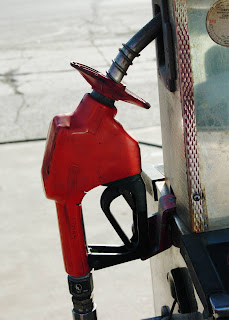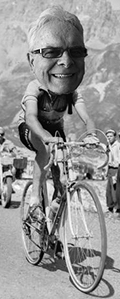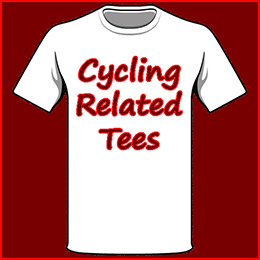What if gas were $10 a gallon?
 Mon, May 19, 2008
Mon, May 19, 2008 
An article on MSN Money Central began as follows:
...."In four years, U.S. gas prices have doubled to more than $3.70 a gallon, and crude oil has tripled to around $125 a barrel.
Allowing for inflation, that's higher than prices were during the 1978–83 oil shock that triggered a recession and sky-high interest rates.
But . . . What if gas cost $10 a gallon?
Thousands of truckers would go bankrupt. Airplanes would sit idle in hangars. Restaurants and stores would shut down. Car-pooling, hybrid vehicles, scooters and inline skates would swing into vogue."
I find it strange that the writer would mention inline skates and miss the obvious choice in human power vehicles, namely the bicycle. As for truckers going bankrupt, some will, but goods will still need to be shipped whatever the cost.
There will be rising prices and inflation, which will affect everyone; however, those who can run a tight budget and spend less on gas, will fair better. Some low-income families will not be able to run a car.
...."According to Todd Hale, a senior vice president for consumer researcher Nielsen, at $10 a gallon, the average family's gas bill would leap from 16% of its retail spending to about 40%.
People would drive less, yes. But many have to drive to work or the supermarket, and they'd cough up the cash -- screaming all the way -- and cut back elsewhere."
Yes, many will still drive and even some will still drive SUVs; they will become even more of a status symbol. There will be more compact cars or the road, and a lot more motorcycles, scooters, and mopeds.
Not everyone will ride a bicycle, but for those of us who do, share the road will be a lot easier.
Public Transport will make a comeback, which will ease congestion further. Even long before gas reaches $10, we will see less joy riding in cars on the weekends, leaving roads less congested and more pleasant for bike riding.
...."Taxis and FedEx would be strictly for the well-heeled. And home pizza deliveries would cease. Pizza delivery drivers also pay for their own gas. "It'd be brutal," says Joseph Miller, an assistant manager at a Domino's Pizza in Seattle. "I would think we wouldn't have any drivers."
Pizza can be delivered by bicycle. All kinds of restaurant food is already delivered by bicycle in New York City, and in other large cities; it is the most efficient way in many cases. In fact, as less people drive to eat out, restaurants will be forced to consider other alternatives.
In many parts of the world, Europe and Japan for example, gas is already close to $10 a gallon. People still survive, and adjust to their economies. By the time gas reaches $10 in the US, $10 will be worth a lot less in terms of what it will buy.
American consumers have been spoiled for so many years by cheap gas, welcome to the real world.
Read the complete article
 Dave Moulton | Comments Off |
Dave Moulton | Comments Off | 

















Reader Comments (25)
It's not like this is the first time we have changed the way we live. I see this as a step back towards better times.
And no, it hasn't recreated the village - we're just as much suckers to big box out-of-town shopping as people are in the USA.
The scary thing is that it doesn't seem to have had any effect on people's driving habits. I've noticed more cyclists recently, but only in the 'leisure' category - there really don't seem to be more people cycling to work / the shops / wherever.
Makes me wonder HOW high the price'll have to go before people realise that there are just better things to spend their money on!
However, here people are cycling. They were doing so a few years ago when petrol was much cheaper too.
The difference is infrastructure which just begs you to cycle. It's much more convenient to cycle than to drive, the scenery is often better (cycle routes are shorter and go through nicer places), you don't have to stop for endless traffic lights etc.
Make conditions for cyclists better than those for drivers and everyone wants to cycle instead of drive.
People are short term thinkers usually. The price of gas goes up, they talk about commuting by bicycle (assuming the weather is nice that day, because not too many people talk about that except during the summer months when they forget that winter is just a few months away). Or they start thinking about a new "hybrid car", or a little Smart car. But a week later, the price of gas goes down a few cents and everything is back to normal.
What we all need is a more comprehensive strategy that includes the bicycle for those who wish to use it as a mode of transportation (keeping in mind that we don't all live in Copenhagen style geography or weather), and both inter and intracity transportation. Probably won't happen though in a society where politicians are unelectable if they don't promise tax cuts.
At a stop light, a 2008, Porsche 911 GT pulled up next to me. It was awesome! When I got to the office I looked on the Porsche website--the car lists for $191,000. I don't think the person that owns it is too concerned about the price of gas--nor will they be concerned about the price of food or anything else.
I don't have a problem with the guy having the money to have that kind of car. Some people will have to drive, at least for now, because they don't have any alternative--because I'm able to take the alternative, I only ask that car drivers be patient and show a little respect and let me ride in peace.
Cheers! Bruce
Matt
How far can a large cup of $4 java (equivalent to oil at $44/gallon) take a family of four? The sky's the limit for this valuable resource. Auto dependency, oil addiction, and poor leadership guarantees more of the same.
Jack
I also think up to a point, most people will be able to 'afford' gas, even though the worry will exist. The majority who will be affected is the lower income class people, farmers etc.
While its terrible that the situation is such, I also think its a good thing - giving a much needed wakeup call in need of change to people and their habits. If people don't change, companies will keep producing the huge,heavy,luxury filled boxes of steel and alloy that guzzle far too much gas than actually needed to get from point A to point B.
The situation is also spurring many developments in alternative fuels and means of transport. You can't simply tell everyone to start riding a bike. Its not the answer but certainly one in many.
Read about it:
http://tonto.eia.doe.gov/dnav/pet/pet_sum_crdsnd_adc_mbbl_m.htm
At current prices of $126/barrel for refined oil, we are spending over $1 billion/day for this addiction. Our dependency is growing as a vast array of products are now produced with oil derivatives and the majority of vehicles sold in the USA continue to be fuel inefficient.
Jack
No future contract for oil are being signed for the SPR.
WASHINGTON (AP) — The Energy Department says it has canceled oil shipments into the Strategic Petroleum Reserve beginning in July when the current purchase contract expires.
The move came days after Congress passed legislation requiring the president to suspend the shipment into the reserve in hopes of lowering gasoline prices.
The Energy Department said it will not sign contracts for new shipments of 76,000 barrels of oil a day for the six-month period beginning July 1. President Bush had opposed halting the shipments, arguing that such a relatively small amount of oil would not influence prices. Current shipments will continue. The reserve is 97 percent full, holding 701 million barrels of crude.
Yeah...we love you too...your taxes keep the roads nice and smooth and clean! Thanks! Oh, and when we are all on bikes and paying taxes to maintain those same roads, we will be saving money b/c what kind of damage could a lowly bike rider do to a road? Road repairs will be almost nil!!
Future looks bright from the saddle folks!!
BTW...whoever submitted that post is a clever biker wanker who just wanted to jerk our chains!! Good post...made me laugh! Thanks!
Roads were paved because of the bicycle lobby groups in the late 19th Century.
http://www.bikeleague.org/about/index.php
You're welcome by the way.
It must hurt to miss the good old days of Reganomics, but even Ronnie didn't meant to make every tax into a user fee.
Vehicle taxes are not a license to use the roads, they are income for hte state.
Tolls are levied on a per use basis either to reduce burden on the taxpayer for construction or maintenance or to generate income for the state.
Some roads restrict access to types of vehicles for safety or design reasons.
The public roads are a public good. Regardless of how they are funded, and it's never solely from motor vehicle taxes, they are available for all to use.
Which is cheaper than taking mass transit in the twin cities (2 rush hour tickets each way would cost 8 dollars a day). Our minivan drove 298 miles on 14 gallons of gas last time we topped off.
For the last two weeks I have biked from her employer to mine, shaving 10 minutes driving off the commute (different route driving--same milage fewer lights). We'll see what driving 13 miles with less stop and go does for fuel economy.
If driving to work is such a burden, I think moving closer to work or buying a more efficient vehicle are reasonable solutions. Maybe both would be a good move.
I ride to work 5 days a week and use my bike for shopping as well, even if it takes a couple of trips. I only use the 4 cylinder, car when I have to take the family out. And I try and encourage others to do the same.
Governments need to start taxing the large car/4WD/SUV owners more as they use more petrol and leave a larger carbon footprint as well.
For folks who live in the rural American 'wide open spaces', in most situations cycling would be an impractical choice as a daily transportation device. Yeah, we all read about the cycling friendly countries in Europe, but realize geography is a great advantage in these countries...they are much smaller and more densely populated than America. Cycling is universally more practical so more people bike, hence these countries provide cycling infrastructure.
I think the best transportation solutions here in the States would include a multitude of solutions: for the urban areas more bike lanes and infrastructure, improved access to public transportation (e.g. buses and bike racks on buses), park and ride areas for longer distances, where you could ride a bike to a secure bike parking area, then hop on a bus to ride the remainder of the trip. I'm sure there are many other alternatives as well. For urban areas, carpooling could greatly decrease the number of vehicles on the roads. We certainly should follow Brazil's example and utilize alternative fuels (e.g. ethanol, soy diesel) to become less dependent on foreign oil.